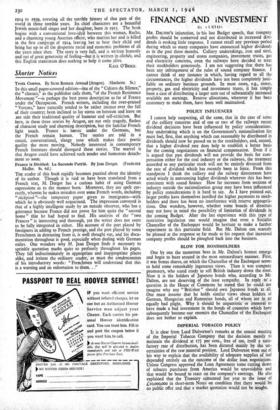THE reader of this book rapidly becomes puzzled about the
identity of its author. Though it is said to have been translated from a French text, M. Dorgot has a curious habit of using German expressions as to the manner born. Moreover, they are spelt cor- rectly, whereas he makes mistakes over some French words, including " recepisse "—the temporary paper given to immigrants—with which he is obviously well acquainted. The impression conveyed is that of a highly intelligent study by an outside observer, who has a grievance because France did not prove for him quite the "second home" th'at he had hoped to find. His analysis of the "two Frances" is interesting and thorough, yet the writer does not seem to be fully integrated in either. His account of the part played by foreigners in adding to French prestige, and the part played by some Frenchmen in detracting from it, is well thought out, and his docu- mentation throughout is good, especially when dealing with German exiles. One wonders why M. Jean Dorgot finds it necessary to sprinkle quotation marks quite so profusely throughout his pages. They fall indiscriminately in appropriate and inappropriate places alike, and irritate the ordinary reader, as must the condescension of his introductory words: "Frenchmen Will understand that this is a warning and an exhortation to them. .."


























 Previous page
Previous page